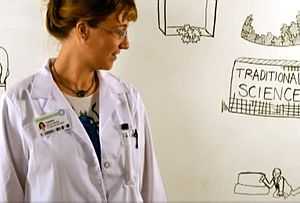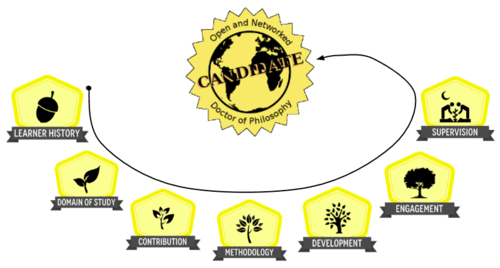Doctor of Philosophy


Doctor of Philosophy, abbreviated as PhD is an academic degree traditionally awarded by universities.
This is a project space to develop at equivalent we're calling the Open and Networked PhD (ONPhD).
Work to date has made it as far as articulating an equivalence to the formal PhD stage called Candidature. Other stages to the ONPhD are yet to be developed.
Requirements
A traditional PhD requires acceptance from a University to become a PhD Candidate. There is usually a variety of processes that candidate can follow toward publishing a thesis, or similar. See a relevant University's website for their requirements.
An ONPhD does not require affiliation to a university, but does require the publication of a thesis or similar, that is assessed by peers to equivalent criteria. To date an ONPhD is not recognised as a PhD, but we do hope to establish a process where it can be shown to be equivalent to, if not an improvement on, the traditional PhD criteria and assessment.
As in a traditional PhD, an ONPhD will require:
- Candidature
- Literature review
- A question
- Coursework or documeted learning
- Research
- Publication and review
Candidature

Follow the steps below to establish your candidature for ONPhD. We have developed a set of digital badges for each of these steps. See the course on P2PU, and the manual for earning the badges.
- Describe your learning history - This is a cumulative description of all the works (formal and informal) you have completed to be considered toward your candidacy for an ONPhD
- Identify your domain of study - The described domain of study should be both broad and focused. This is to allow others to get a sense of both the knowledge domain and your focus.
- Detail your contribution - What of considerable significance are you going to contribute to your chosen subject domain of knowledge?
- Methodology - Completion of a PhD requires a significant reseach project or major contribution to your chosen knowledge domain.
- Skills and Knowledge Development - Completion of a PhD level of knowing also requires the development of other related skills and knowledge.
- Engage the community - How are you going to engage the learning community and your learning network
- Seek supervision and endorsements - Identify the people in your learning network who are going to supervise or guide your research and assist your publication.
Literature review

INCOMPLETE - Work has not commenced around the ONPhD equivalent to the literature review. Below is a suggested list of steps and we propose that those steps be developed in a similar fashion to the Candidature stage.
- Demonstrate thorough knowledge of a wide range of literature relating to your topic.
- Engage in critical appraisal of these works.
- Arrive at a question or "gap" in the literature, that you will structure your thesis around.
- Understand where your investigation sits in relation to the literature you have reviewed.
- Begin to position your thesis in terms of world view (philosophical framework), the types of methods you will use to investigate and test your ideas (methodical framework), and the way you will operate those methods (operational framework – including the definition of what is data and how it is appraised/analysed).
Forming a research question
INCOMPLETE - Work has not commenced around the ONPhD equivalent to the development of a research question. We propose that a list of steps be developed in a similar fashion to the previous stages.
Coursework and learning
INCOMPLETE - Work has not commenced around the ONPhD equivalent to the development of courses to support people in their projects. We propose that relevant courses be developed across Wikiversity and listed here.
- Sport research
- Open educational resources
- Social media
- Other suggestions
- Your course here
Research
INCOMPLETE - The work included here has been gathered from available content on Wikiversity that is deemed relevant. Further work to customise this to ONPhD has not yet taken place. We suggest that this section be developed into steps as with previous sections, to guide a candidate through all necessary considerations about developing and conducting a research plan.
All research is pivotal on methods – which requires sound alignment between:
- World view
(philosophical framework)
- Methodical approach
(methodical framework)
- Methods
(operational framework – including the definition of what is data and how it is appraised/analysed).
- What is research?
- Research design
- Finding research
- Critiquing the literature
- Validity and reliability of data
- Ethics
- Data analysis and visualisation
- Writing
- Getting published
- Grant applications
- Presenting your work
- Ethics
Steps are needed for guiding a candidates consideration of the ethics of research, and how to obtain an equivalent to ethical clearance of research that is normally offered by a research university.
Publication and review
INCOMPLETE - We suggest that this section be developed as a list of optional courses, that guide people in the publication of their research findings.
- The Directory of Open Access Journals
- w:Thesis
- Thesis structure - By Dr Mary Walsh
Communications and support
To stay in contact with others who are openly documenting and networking their PhD work, please consider the following:
- The email forum on GoogleGroups: Open and networked PhDs
- tag onphd = Twitter, G+
- tag openphd
- The participant's list here on Wikiversity:PhD
Assessment Criteria for ONPhD
INCOMPLETE - We suggest that this section be developed as a list of steps and courses, that guide people in the assessment of particular approaches to ONPhDs. The steps are universal and the courses are for unique assessment needs. We propose the following steps be universal:
- Original research
- Thesis is situated within a linage of philosophy, theory and/or research
- Data openly accessible online
- Thesis is developed and published iteratively (by publication)
- Continuous or iterative peer to peer review that is openly documented
- Manuscript or similar is freely accessible online
Examples of PhDs and candidates using Wikiversity
- User:Jtneill/PhD - completed
- User:Cormaggio/Thesis - completed
- User:Leighblackall/PhD - in progress
- User:Peterrawsthorne/PhD - in progress
- User:SarahStewart/EdD - in progress
- User:Steelemaley/PhD - in progress
- User:Alexanderhayes/PhD - in progress
- User:Yvessimon1/PhD - in progress
See also
- Collaborative research on Wikiversity
- Networked learning
- Doctor of Philosophy
- Qualitative research
- Wikiquals